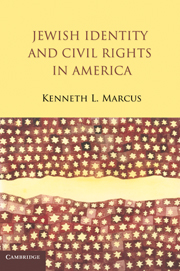Book contents
- Frontmatter
- Contents
- Acknowledgments
- Introduction
- 1 The Dilemma of Jewish Difference
- 2 The Jewish Question in Civil Rights Enforcement
- 3 The New Campus Anti-Semitism
- 4 Criticism
- 5 First Amendment Issues
- 6 Misunderstanding Jews and Jew Hatred
- 7 Institutional Resistance
- 8 The Originalist Approach
- 9 Scientific Theories
- 10 Social Perception
- 11 The Subjective Approach
- 12 Anti-Semitism as Harm to Racial Identity
- Conclusion
- Index
- References
5 - First Amendment Issues
Published online by Cambridge University Press: 05 June 2012
- Frontmatter
- Contents
- Acknowledgments
- Introduction
- 1 The Dilemma of Jewish Difference
- 2 The Jewish Question in Civil Rights Enforcement
- 3 The New Campus Anti-Semitism
- 4 Criticism
- 5 First Amendment Issues
- 6 Misunderstanding Jews and Jew Hatred
- 7 Institutional Resistance
- 8 The Originalist Approach
- 9 Scientific Theories
- 10 Social Perception
- 11 The Subjective Approach
- 12 Anti-Semitism as Harm to Racial Identity
- Conclusion
- Index
- References
Summary
Literary critic and First Amendment scholar Stanley Fish has commented that crying “First Amendment” is the modern equivalent to crying “Wolf!” This is particularly true, he argues, in the academy, where “the First Amendment … is invoked ritually when there are no First Amendment issues in sight.” Interestingly, Fish observed that the First Amendment is misused most frequently on college campuses to defend anti-Jewish activities. Fish gave several examples. At the University of Illinois at Champaign-Urbana, a student newspaper printed a letter arguing that Jews manipulate America and urging the president to terminate Jews from all government positions lest they “face another Holocaust.” At Santa Rosa Junior College, a student published an article arguing that anti-Semitism is the result of Jewish behavior. At Harvard, the Education Department invited, disinvited, and then reinvited poet Tom Paulin to deliver a distinguished endowed lecture. Fish notes that Paulin, as we have seen in Chapter 3, had urged that Jewish settlers be shot dead and argued that Israeli police and military forces were the equivalent of the Nazi SS. In all these examples, Fish argues, campus figures have justified their role in anti-Semitic expression by insisting that it was mandated by the First Amendment. In fact, however, as Fish points out, anti-Semites have no constitutional right to receive such invitations and publications. Those who invite such Jew hatred do so out of their own discretion and bad judgment.
In the Irvine case, the administration has consistently maintained that the alleged harassment of Jewish students is protected by the First Amendment. Early on, administrators at the University of California at Irvine quoted to Department of Education’s Office for Civil Rights’ (OCR’s) San Francisco investigators an OCR guidance letter that I had written for then-Assistant Secretary Gerald Reynolds. That letter clarified that OCR regulations “do not regulate the content of speech” and that “OCR does not require or prescribe speech, conduct or harassment codes that impair the exercise of rights protected under the First Amendment.” Nothing in my First Amendment letter, however, had suggested constitutional protections for the outrageous conduct that Susan Tuchman alleged. Oddly, Dean Erwin Chemerinsky, Irvine’s widely respected constitutionalist, actually has argued that the allegations at Irvine involve only speech. This is a rather remarkable (and clearly false) argument in light of the nonspeech elements alleged in that case: stone throwing, vandalism, and so on.
- Type
- Chapter
- Information
- Jewish Identity and Civil Rights in America , pp. 76 - 80Publisher: Cambridge University PressPrint publication year: 2010



